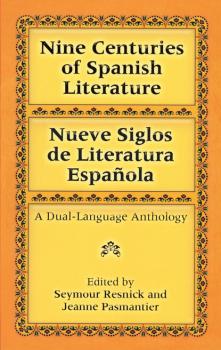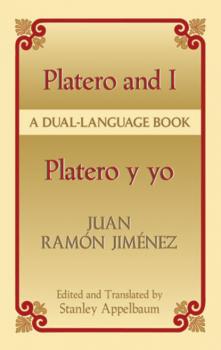Dover Dual Language Spanish
Скачать книги из серии Dover Dual Language SpanishA Second Spanish Reader
Geared toward advanced beginners, this dual-language volume offers the convenient, accessible format of English translations on pages facing the matching Spanish text. It introduces such authors as Lope de Vega, Cervantes, Alarcón, Unamuno, and Darío, and such works as El buscón, Cartas marruecas, El estudiante de Salamanca, and Santa. Contents include plays, lyric and narrative verse, and prose of many kinds—fiction, philosophy, autobiography, and more—for a generous sampling of the Spanish language's extraordinarily diverse and rich literary history.The selections begin at around 1550, at the outset of the 100 years known as the Golden Age. Excerpts from the era's major genres and authors include the works of three prominent playwrights, plus pastoral and picaresque novels, religious meditations, and a report from the New World. Three outstanding exponents of the Enlightenment appear here, in addition to contributions from the major Romantic playwrights and poets, several Realist and Naturalist novelists, and the pillars of the Generation of 1898. One-third of the selections are the works of Spanish-American writers. Accurate and up to date, this new translation by Stanley Appelbaum features a detailed Introduction with background on all of the writers and their works.
Spanish Stories
Designed for the lover of fine literature as well as the intermediate language student, this dual-language book contains 13 great, representative Spanish short stories. Chronologically arranged to illustrate the development of the story form in Spanish, the stories are presented both in Spanish and English, enabling students to learn a language while simultaneously studying literary classics. Edited by former Queens College professor Angel Flores, the volume includes brilliant works not available in any other edition published in the U.S. First-rate stories range from the medieval tales of Don Juan Manuel and the classics of Cervantes, Alarcon and Miguel de Unamuno to the highly acclaimed contemporary works of Jorge Luis Borges, Camilo Jose Cela, and Juan Goytisolo. Also included are satirical views of Spanish life by Leopolda Alas (Clarin) and Emilia Pardo Bazan, charming sketches by Ricardo Palma, and the socially and politically inspired writings of Benito Lynch and Horacia Quiroga. With this book, language students will be able to follow Spanish classics in the original while having immediate access to a complete, faithful English translation on the facing page. The dual format saves hours in word-hunting and note-taking, allowing more time for intensified study of the language, building vocabulary and practicing conversation. The present volume also contains an informative essay on Spanish literature, a biographical-critical introduction to each story, notes on obscure references and idioms and a Spanish-to-English vocabulary.Students of language and comparative literature will find the dual-language format convenient and helpful and the stories deeply satisfying; readers interested in Spanish literature will want to add this important and stimulating collection to their personal libraries. 
Stories and Poems/Cuentos y Poesías
One of the most important Latin-American writers of the late nineteenth and early twentieth centuries, Nicaraguan poet and essayist Rubén Darío (the pen name of Félix Rubén García Sarmiento) is considered the high priest of the modernismo school of literature, known for its dazzling verbal virtuosity and technical perfection. The present volume contains a rich selection of Darío's best poems and stories, carefully chosen from Azul (Blue), Prosas profanas (Worldly Hymns), Cantos de vida y esperanza (Songs of Life and Hope), El canto errante (The Wandering Song), and Poema del otoño (Poem of autumn). Stanley Appelbaum has provided accurate English translations (line for line in the poetry section) on the pages facing the original Spanish, as well as an informative introduction to Darío's life and work, and annotations to the individual stories and poems. The result is a superb resource for any student of Spanish language and literature or anyone interested in one of the earliest and most influential literary movements of the twentieth century.
Spanish Stories of the Late Nineteenth Century
These eleven tales are by four outstanding nineteenth-century authors whose work brought new life to Spanish literature. Published between 1870 and 1900, they include «El Hechicero» (The Sorcerer), by Juan Valera, a highly polished allegorical retelling of an Andalusian legend. Pedro Antonio de Alarcón’s tale of bandits, «La buenaventura,» appears with his «La Comendadora,» inspired by an incident in a Granada convent. Three tales by Leopoldo Alas («Clarín»)–"Adios, Cordera," «Cambio de luz,» and «Benedictino»–exemplify the author's remarkably protean style. Emilia Pardo Bazán's stories («Afra,» «La Santa de Karnar,» «La cana,» «Dios castiga,» and «La Mayorazga de Bouzas») take place in her native Galicia. All exhibit the violence that fascinated Pardo Bazán, along with the independent, courageous female characters who populate her work.This dual-language edition features an informative introduction and ample footnotes, making it not only a pleasure to read but also a valuable learning and teaching aid for students and teachers of Spanish literature.
Mexican Short Stories / Cuentos mexicanos
Greatly influenced by Europe's nineteenth-century literary trends, Mexico's writers crafted some of the most phenomenal prose fiction in Spanish America. This collection offers a rich sampling of significant Mexican short stories published from 1843 to 1918. Nine different tales range from the realism of López Portillo's “Reloj sin dueño” and the modernismo saturating Gutiérrez Nájera's «La mañana de San Juan» to the historical accuracy of Riva Palacio's «Las mulas de Su Excelencia» and the vivid romanticism of «Amor secreto» by Manuel Payno, named the «father of Mexican short stories.» Each story appears in its original Spanish text with expert English translations on each facing page. This dual-language edition features a fascinating new introduction and ample footnotes. An easy-reading pleasure for lovers of fine Spanish-language literature, it is also a valuable educational aid for students and teachers.
Nine Centuries of Spanish Literature (Dual-Language)
This rich sampling of Spanish poetry, prose, and drama includes more than seventy selections from the works of more than forty writers, from the anonymous author of the great medieval epic The Poem of the Cid to such 20th-century masters as Miguel de Unamuno. The original Spanish text of each work appears with an excellent English translation on the facing page.The anthology begins with carefully selected passages from such medieval classics as The Book of Good Love by the Archpriest of Hita and Spain's first great prose work, the stories of Count Lucanor by Juan Manuel. Works by writers of the Spanish Renaissance follow, among them poems by the Marqués de Santillana and excerpts from the great dialogue novel La Celestina by Fernando de Rojas.Spain's Golden age, ca. 1550-1650, an era which produced its great writers, is represented by the mystical poems of St. Teresa, passages from Cervantes' Don Quixote and scenes from Tirso de Molina's The Love-Rogue, the drama that introduced the character of Don Juan to the world, along with other well-known works of the period. A cavalcade of stirring poems, plays and prose selections represent Spain's rare literary achievements of the 18th, 19th and 20th centuries.The translations were chosen for their accuracy and fidelity to the originals. Among the translators are Lord Byron, Henry Wadsworth Longfellow, Edward FitzGerald and John Masefield. As a treasury of masterly writing, as a guide for the student who wants to improve his or her language skills and as a compact survey of Spanish literature, this excellent anthology will provide hours of pleasure and fruitful study.
Platero and I/Platero y yo
Recipient of the 1956 Nobel Prize for Literature, Jian Ramón Jiménez (1881–1958) ranks among the foremost Spanish poets. The early influences of German Romanticism and French Symbolism led Jiménez to the development of his unique voice, and he became a leader in the vanguard known as the modernistas, who staged a Spanish literary revival at the turn of the twentieth century.Jiménez's most popular work, Platero y yo, unfolds in his native Andalusia. A series of autobiographical prose poems about the wanderings of a young writer and his donkey, it first appeared in a shorter version, suitable for children, in 1914. This new, accurate English translation is drawn from the complete edition, which was published in 1917. The only dual-language edition of this classic of Spanish literature, it is accompanied by an excellent introduction and explanatory notes that will assist students in understanding and appreciating this work.
Introduction to Spanish Poetry
From the 12th-century Cantar de Mío Cid to the 20th-century poetry of García Lorca, Salinas, and Alberti, this book contains 37 poems by Spain's greatest poets. Selected by Professor Eugenio Florit, the poems are presented in the full original Spanish text, with expert literal English translations on the facing pages. Enjoy the poetic inspiration, imagery, insight, and wisdom of such masters as Lope de Vega, Miguel de Unamuno, Federico García Lorca, Margués de Santillana, Jorge Manrique, Garcilaso de la Vega, Fray Luis de León, San Juan de la Cruz, Francisco de Quevedo y Villegas, Gustavo Adolfo Bécquer, Antonio Machado, Rafael Alberti, Pedro Salinas, and many more. In addition to the poetic texts, Professor Florit has also provided a wealth of biographical and critical commentary, outlining the significance of the poets and their works in the long tradition of Spanish literature. Portraits of the poets are included where available.
Fields of Castile/Campos de Castilla
Master poet Antonio Machado y Ruiz is widely regarded as one of the twentieth-century’s greatest Spanish writers. His collection of poems celebrating the region of Castile made him one of the primary voices of the Generation of 1898 — a brilliant group of writers dedicated to Spain's moral and cultural rebirth after the Spanish-American War. Machado's lyrical Campos poems, tinged with nostalgic melancholy, are powerfully introspective and meditative, revealing an evolution away from his previously ornate, Modernist style. With these magnificent poems, Machado moved toward a simpler, more authentic approach that would later distinguish all of his works.This unabridged edition of Machado's landmark Campos de Castilla is presented in a dual-language format which features an excellent new translation on pages facing the Spanish original. A fully informative introduction and comprehensive notes by the translator are also included.
Selections from Don Quixote
Miguel de Cervantes [Saavedra]
One of the great masterpieces of world literature, Don Quixote de la Mancha is a picaresque romance that has amused and delighted generations of readers. This dual-language edition, featuring selections from the famed novel, brings vigorously to life the satiric adventures of the idealistic would-be knight and his faithful servant Sancho Panza. Presented in the original Spanish, with excellent new literal English translations on facing pages, the passages have been carefully selected to capture the wonderful flavor and romance of the complete work. Readers will delight in scenes describing the comical manner in which Don Quixote was knighted, his valiant battle with the windmills (mistakenly perceived by the errant knight as giants), the misfortunes suffered by the undaunted knight and his squire at an inn, Sancho's report of his meeting with the lovely Dulcinea, the fight with the wineskins, and much more. Stanley Appelbaum, translator of this volume, has also provided an informative Introduction and ample footnotes, making this edition not only an enjoyable reading experience, but a valuable learning and teaching aid for students and teachers of Spanish literature.









